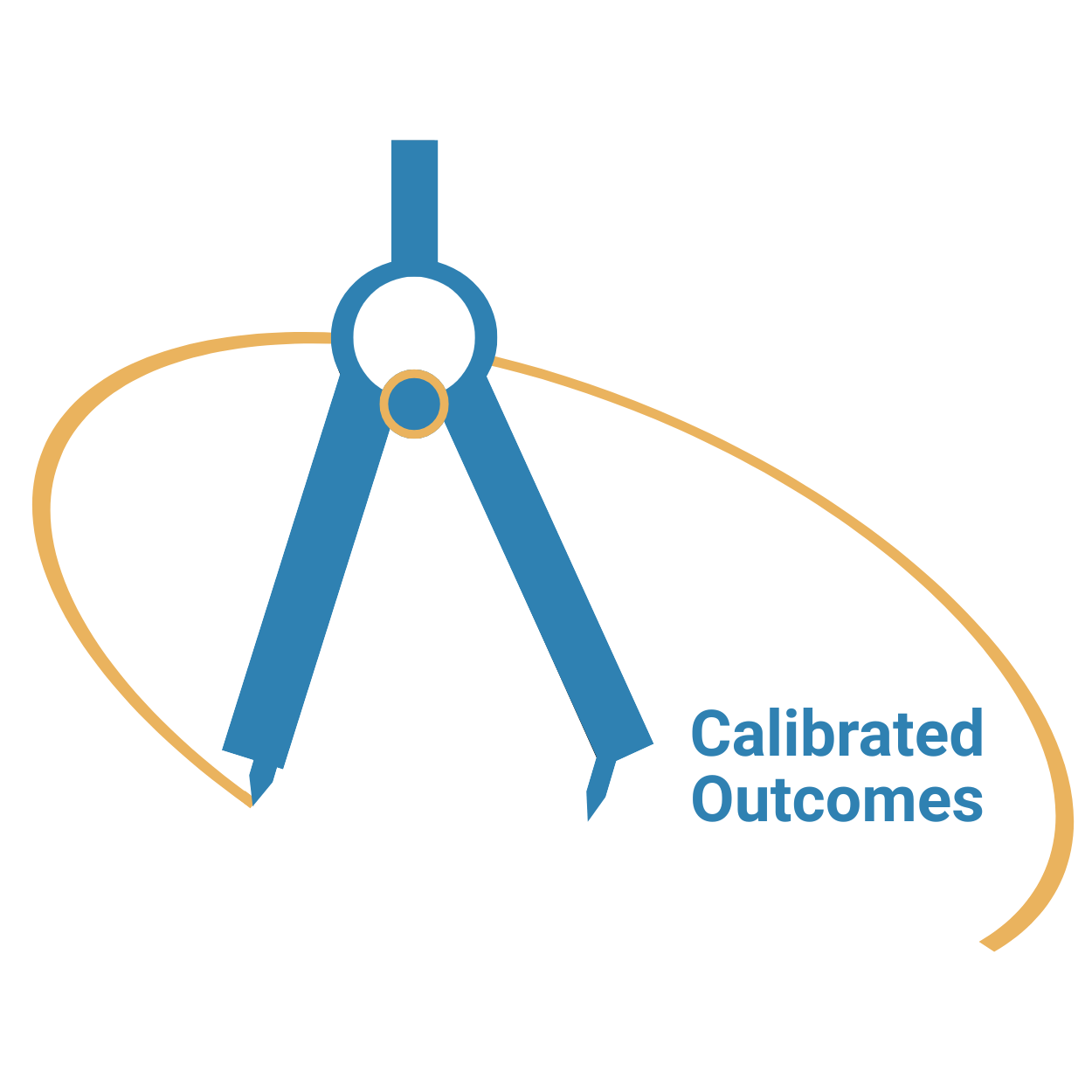What is Calibrated Outcomes?
Calibrated Outcomes helps students identify their individual goals, strategies, and next steps to be leaders in their own behavior change.
Not another online module to click through.
Not a reflection paper for artificial intelligence to write.
Calibrated Outcomes are synchronous, interactive, face-to-face group workshops for students who need focused education on how to do and be good in college.
Calibrated Outcomes guide students toward an understanding and goal-development in topics like restorative action, academic integrity, intentional decision-making, and more.
Facilitated by experienced an student affairs educator, Calibrated Outcomes will actively engage college students to participate in the workshop and document their own reflections and goals.
We’ll provide colleges and university with a summary of your students’ participation, and your students will provide you with their documented learning and reflection.
Register as a student
If your school assigned you to complete a Calibrated Outcomes workshop, your first step is to register with us and schedule your attendance. Be sure you know which workshop(s) you need to complete. Below are specific workshop descriptions and links to schedule for a specific workshop.
Register for Deciding on Purpose
Register for Designing Academic Integrity
Register for Doing “Sorry” Like You Mean It
Register as an institution
Institutional registration is free and provides your office with template descriptions for outcome letters, the ability to pre-purchase workshop slots at a discount for your students, and a preview of completion and participation reports. Annually, all registered institutions will receive a report on Calibrated Outcomes.
Read workshop descriptions
You can learn more about the workshop options through Calibrated Outcomes and view the schedule of upcoming workshops.
Deciding on purpose:
Aligning your decisions with your values
Deciding on Purpose guides students to clarify their values and examine their decision-making patterns, including how to integrate intent, ethics, and impact as they execute decisions.
Designing academic integrity: Creating habits and understanding
Designing Academic Integrity helps students identify resources, time management strategies, and values to cultivate their plan for academic success.
Doing “sorry” like you mean it: Identifying and repairing harm
Doing “Sorry” Like You Mean It engages students in the challenging work of understanding how harm is experienced, its multi-faceted impacts, and strategies for repairing that harm.
Your conflict compass: Navigating how you disagree
Your Conflict Compass helps students identify their conflict style and how they can use it to communicate effectively during conflict conversations.
You ARE one of us: Welcoming new members to your organization
You ARE One of Us focuses student leaders on positive ways to welcome new students to their organization and how to interrupt harmful approaches to new member processes.
Calibrated Outcomes: Frequently Asked Questions:
Click to jump to the question. If you don’t see your question here, please email me at info@calibrateducational.com
I'm having an issue registering/buying institutional credits. Can you help me?
What makes this better than a reflection paper or a workshop on our own campus?
So any student from a registered institution can sign up for any workshop?
Will you tell me if my student(s) didn't attend the workshop?
What if only one student registers. Will you cancel the workshop?
What happens if Calibrated Educational Consulting cancels a workshop?
I wish Calibrated Outcomes offered a workshop on a new topic. How can I get you to develop that?
I'm having an issue registering/buying institutional credits. Can you help me?
Absolutely. Please email info@calibrateducational.com. If you can include a screenshot of your difficulties and a phone number, we will get back to you within two business days.
What makes this better than a reflection paper or a workshop on our own campus?
For communities that have the staffing and the volume to host similar workshops in-person on your campus, I think that’s an ideal situation. Do that.
Lots of schools don’t have the staffing or the critical mass of student participants to make those workshops the interactive learning experience that they’d like.
Reflection papers are a great tool when they work. They are not adaptive to learning styles and needs the way a synchronous workshop can be and, increasingly, I worry students use artificial intelligence for their reflection papers.
Calibrated Outcomes workshops provide students with an interactive, synchronous, engaging learning experience that helps them reflect, build new habits, and be leaders in their own development. Every single workshop includes moments of tracked engagement, documented reflection and goal development, and a follow-up with participants to check-in on how they are meeting or struggling with their goals.
So any student from a registered institution can sign up for any workshop?
Yes. Calibrated Outcomes workshops are open to any student from any registered institution. We’ll confirm they have an @[registered institution].edu email address so we can send you the correct attendance and participation report.
Who pays for the workshop?
That’s up to you. Any registered educational institution can pre-pay for workshop registrations at 10% discount for their students and then distribute registration codes as they see fit. You can also have students register without a code and pay directly at a cost of $40/student. You can choose different approaches for different students. If you want to arrange a custom payment (for example, your institution wants to pay half the registration cost), email info@calibrateducational.com and I can set that up for you.
What's in the attendance and participation report I receive after my students participate in the workshop?
After each workshop, I send a report to each institution that had any students attend::
Names and email addresses of attending students
A brief summary of participation opportunities and whether or not they engaged at those moments
I also reserve the right to notify institutions of any concerns that arise with their students during the session.
During the session, students will complete an individual reflection, and they will have a copy they can provide to you directly. The reflection system I use does record their responses, so I am happy to provide those if the authoring student requests I do so.
Do students have to turn on their cameras?
They don’t. Too many students have privacy needs, variable internet, disability accommodations, and other circumstances that make on-camera participation a barrier. While I encourage students to turn on their cameras, I don’t rely on that approach for participation or engagement.
Can you guarantee disability accommodations?
I strive to make the workshops an inclusive and welcoming space that readily adapts to the needs of learners; that’s one of the advantages of synchronous learning taught by an experienced educator. That said, I can’t guarantee every disability accommodation. The following are part of every workshop: (a) additional time to finish reflections; (b) closed-captions; (c) allowing participation verbally, in-writing, or not at all; (d) allowing participants to have their camera on or off; and (e) not relying on visual cues. When students register, I invite them to identify any disability accommodations, and I’ll work to meet those to the best of my ability. If your institution has determined the student has a reasonable accommodation that I can’t meet, I’ll refund any registration fees they’ve incurred.
What student information does our school need to provide?
Nothing! No need for a FERPA waiver or confidentiality agreement. Students do the registration themselves, disclosing only their own information (which is directory information). If a student or your institution has concerns about any disclosure, please let me know.
Will you tell me if my student(s) didn't attend the workshop?
Because I don’t gather identifying student information from institutions, but directly from students, I won’t typically notify you if a student doesn’t attend. That said, if you want to confirm attendance or ask about it, feel free to reach me at info@calibrateducational.com
I have a student that has a conflict with all the scheduled options. Will you offer a workshop just for them?
We try to offer the workshops at a range of times that are likely to work for students across several time zones. That said, I can’t guarantee times that will work for every student. However, if a student is having trouble scheduling, they should contact me directly at info@calibrateducational.com. I may be able to rearrange an open workshop that allows them to attend.
What if only one student registers. Will you cancel the workshop?
Nope! While the learning experience is designed for a group, the workshop is fine for one student. We will go ahead with just one student.
If a workshop has no registered students, it may be canceled or rescheduled at any time.
What happens if Calibrated Educational Consulting cancels a workshop?
If I have to cancel a workshop, I will (a) arrange a workshop that accommodates their schedule within the next three weeks or (b) provide them with a refund. In both cases, I’ll be happy to verify their efforts to participate.
Will you provide a workshop in person on our campus?
I’m happy to do that! In-person, synchronous workshops are great for orientation and pro-active student leader development. To start that planning, send me some information through this form.
In addition to using this as a conduct sanction, can we use this with student leaders and new students?
Absolutely! While my professional origin story is grounded in student accountability processes, I’ve designed these workshops to be a positive experience for any student to be a leader in their own development.
I wish Calibrated Outcomes offered a workshop on a new topic. How can I get you to develop that?
Cool! I love new ideas. With each annual report, I’ll invite registered institutions to suggest new ideas. You can email those any time at info@calibrateducational.com
How do you assess the workshops?
Students complete a brief pre- and post-workshop survey. I also review their reflection responses for assessment purposes. Finally, I follow-up with students approximately a week after their participation to check in on how they’re doing with their habits and goals set during the workshop. This assessment information will be included in the annual report.
When will you post the schedule for the next academic term?
I’m glad you’re looking forward to it!
The schedule for January-May will go live by January 2.
The schedule for August-December will go live by July 1.
I’m still evaluating the client-need for workshops during the summer. I’ll post that schedule by May 1.
If you have questions about the schedule, please email info@calibrateducational.com
What is your refund policy?
If I cancel a workshop, I will provide a reschedule option and offer a refund if that reschedule option does not work. I don’t otherwise guarantee refunds.
If a student has an extraordinary circumstance that they believe merits a refund or a reschedule without cost, they can email info@calibrateducational.com. I know that life happens.
If a student simply misses the workshop, they’re welcome to register to attend another at their own cost or your institution can provide them with another pre-purchased registration code.
If your question isn’t answered above, please email it to info@calibrateducational.com





